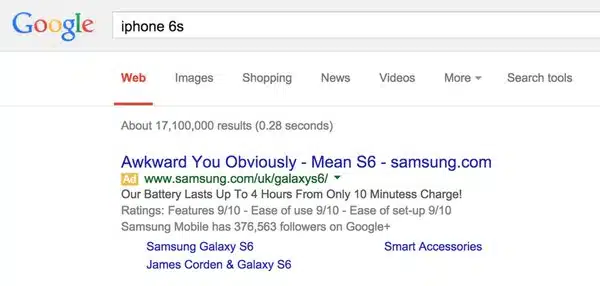Does the use of a trade mark in Google Adwords considered to be an infringement? What about the use of trade marks as keywords to trigger an ad on Adwords?
Early last year, Samsung gained some positive coverage within the marketing industry for running the ad shown below.
Terminology
Keyword – A keyword in online advertising is a word or phrase which can be used by an advertiser to target their products or services to an audience. When a search engine user types in a keyword, they will see ads from advertisers who have selected the keyword to display their ads.
The ad was shown to users searching for the then new ‘iPhone 6s’. The ad cleverly omitted the use of the word ‘iPhone 6s’ while being creative enough to mention their own new phone model. The use of registered trade mark as keywords for advertising is one issue which has been taken to court by Interflora against M&S.
Use of registered trade marks as keywords for ads
Google Adwords and other similar tools allow users to select keywords, which they can bid upon to display their adverts. This is a common and popular method of advertising on search engines like Google. The Samsung example above displays an Adwords ad.
In the case brought to the court by Interflora, the company claimed that M&S was using its trade mark to advertise their flower service. They sued M&S for trade mark infringement. The High Court found that the advertisements led users to believe that the M&S flower service was part of Interflora. M&S took the case to the Court of Appeal on various grounds, one of them being wrongful burden of proof on the defendant to prove their ad made a clear distinction between M&S and Interflora.
Read more about the Interflora v M&S case.
The Court of Appeal overturned the judgement of the High Court. They came to the conclusion that the there was nothing objectionably wrong with keyword based advertising. The argument put forward was that in such scenarios, trade mark rights should not prevent fair competition.
This case sets a good precedent for the use of keywords to advertise on. Based on this case, the onus is upon on the claimant to prove that their trade mark was infringed.
The use of registered trade marks as keywords for advertising is commonly practised today. The European Court of Justice (ECJ) had set the following principle after the Interflora v M&S case:
Offering a keyword which is similar or identical to a registered trade mark is not ‘use’ of the trade mark in the course of trade (arts 5(1) and (2) of the TM Directive 1989 (repealed and superseded by TM Directive 2008) (Google France)
However, one the preceding principles also state that:
The owner of a trade mark with a reputation (TM Directive 1989, art 5(2) repealed and superseded by the TM Directive 2008) can prevent a competitor from advertising using a keyword which corresponds to the trade mark where without ‘due cause’ it takes unfair advantage of, or is detrimental to, the mark’s distinctive character or repute.
Google Adwords has an updated policy which reflects the rules by the ECJ. They do provide a complaint form for matters where the trade mark owner is unhappy with the use of their trade mark in Adwords.
Use of registered trade marks as keywords in ads
In terms of using a trade mark within the ad text, if they are used, Google can investigate and restrict the use of trade mark with in ad. However, there are exceptions for Australia, New Zealand, the United States, Canada, the United Kingdom or Ireland. In these countries, trade marks can be used in ad text in the following cases:
- Reseller and information websites – A trade mark can be used by a reseller if the product or its component are the primary product or service being sold on the landing page. There has to be a method of purchasing the product or service or display commercial information about it. Information pages should also have a landing page focused on the trade marked goods or services with informative details about it.
- Authorised use – A trade mark can be used in ads provided the trade mark owner has authorised its use. The process involves obtaining permission from the owner using Google’s own authorisation form,
We have had enquiries where a business owner has requested assistance on what to do if their company name or trade mark is being used on Adwords. This blog post should clear up a number of issues surrounding the use of trade marks on Adwords and other similar advertising tools. Be cautious if you are planning on using trade marked keywords, If you have an issue with a trade mark, then it would be best to consult a professional. All cases are different so for further advice, please contact us and we will help you over this matter.



